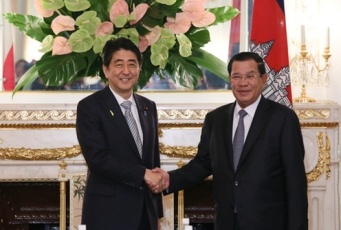Japan-Cambodia Relations
Japan-Cambodia Summit Meeting
 (Photo: Cabinet Public Relations Office)
(Photo: Cabinet Public Relations Office)
 (Photo: Cabinet Public Relations Office)
(Photo: Cabinet Public Relations Office)
On July 4, commencing at 4:15 p.m. for approximately 40 minutes, Mr. Shinzo Abe, Prime Minister of Japan, held a meeting with Samdech Akka Moha Sena Padei Techo Hun Sen, Prime Minister of the Kingdom of Cambodia, visiting Japan to attend the Seventh Mekong-Japan Summit Meeting. The outline of the meeting is as follows.
1. Bilateral Relations
Prime Minister Abe welcomed Prime Minister Hun Sen’s second visit to Japan this year, and stated that he intends to work hard together with Prime Minister Hun Sen for steady implementation of the “New Tokyo Strategy 2015”on Mekong-Japan cooperation. He also expressed his congratulations regarding the April opening of the Tsubasa Bridge in April that was funded with Japan’s ODA, and commented that as a country focusing on “quality infrastructure,” Japan intends to provide steady cooperation in areas such as the development of highways and urban transit systems. In response, Prime Minister Hun Sen offered his congratulations on the success of the Seventh Mekong-Japan Summit Meeting, and stated that the opening of the Tsubasa Bridge is an important contribution to enhancing connectivity not only in Cambodia but also the region as whole. He then thanked the Government and people of Japan, and highly praised that the bilateral strategic partnership that was upgraded in 2013 has been producing results.
2. Political and Security Issues
Prime Minister Abe provided an explanation concerning the “Legislation for Peace and Security” currently under deliberation in the Diet, and stated that Japan’s foundation as a peace-loving nation will not change. In response, Prime Minister Hun Sen highly praised and supported the “Proactive Contribution to Peace” policy including expanding Japan’s role in United Nations PKOs; and commented that he would like the PKO units of the two countries dispatched to South Sudan to engage in cooperation.
Prime Minister Abe also stated that as part of the “Proactive Contribution to Peace” policy, Japan intends to support electoral reforms in Cambodia and the Khmer Rouge Trials. Prime Minister Hun Sen responded by expressing his gratitude with regard to support for electoral reforms and the Khmer Rouge Trials by Japan, and requested Japan’s further support.
3. Economic relations and people-to-people exchanges
Prime Minister Abe stated that under the “Partnership for Quality Infrastructure,” Japan will continue to support the development of infrastructure in Cambodia and strengthening the regional connectivity. He also commented that he hopes Cambodia will take further initiatives to improve its investment environment in order to further boost the number of Japanese companies that have entered Cambodia, which has been increasing in recent years. In response, Prime Minister Hun Sen highly praised the growth in investment by Japanese companies in recent years, and stated that he will conduct initiatives aimed at improving the investment environment, such as reducing electricity costs.
Furthermore, Prime Minister Abe commented that he will continue to engage in cooperation related to developing human resources, which attaches importance on Cambodia, and will proactively promote people-to-people and cultural exchanges between the two countries. In response, Prime Minister Hun Sen expressed his gratitude for Japan’s support related to developing human resources up to now, and stated that engaging in bilateral cultural and people-to-people exchanges is important in order to deepen mutual understanding between the peoples of the two countries.
4. Cooperation in regional and international arenas
Prime Minister Abe and Prime Minister Hun Sen held a meaningful discussion on regional and global issues, such as maritime issues, North Korea, and the abduction issue. Prime Minister Hun Sen expressed his support with regard to Japan’s initiatives aimed at the United Nations reform and Japan’s becoming a permanent member of the United Nations Security Council.

